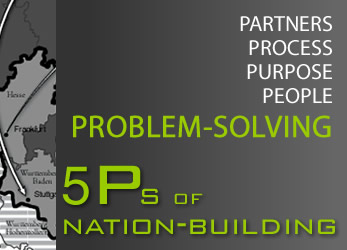Chapter 6 excerpt
Afghanistan and Iraq: Reconstruction after September 11

Click to learn more about the 5 "P"s of nation-building.
This chapter examines how Americans responded to the terrorist attacks of September 11, 2001 with new nation-building efforts in Afghanistan, Iraq, and other countries. Once again, nation-building is an essential part of American PROBLEM-SOLVING, especially in volatile regions of the world filled with failed states and potential threats to the United States.
The people of Afghanistan have endured violence for decades. They've been
confronted with occupation—by the Soviet Union, and then by foreign Al
Qaeda fighters who used Afghan land for their own purposes. So tonight,
I want the Afghan people to understand—America seeks an end to this
era of war and suffering. We have no interest in occupying your country.
We will support efforts by the Afghan government to open the door to those
Taliban who abandon violence and respect the human rights of their fellow
citizens. And we will seek a partnership with Afghanistan grounded
in mutual respect—to isolate those who destroy; to strengthen those who
build; to hasten the day when our troops will leave; and to forge a lasting friendship in which America is your partner, and never your patron.
President Barack Obama, December 2009

The most powerful states dominate international politics, but the
small places in between define the fate of the world. That is the history
of modern Poland, surrounded by Russia to the east and Germany to
the west. Struggles for control of this poor north European lowland
contributed to two world wars and the Cold War. The Korean Peninsula
has a similar history. Conflicts over influence in this mountainous
territory—surrounded by China, Russia, and Japan—have embroiled
the countries of East Asia in wars, rivalries, and recriminations since
the late nineteenth century. Location often matters more than wealth.
Poor places often draw the most attention from the strongest actors.
The most vulnerable societies frequently determine regional security
and the global balance of power.
Afghanistan is the Poland or Korea of the Middle East. Its poverty,
vulnerability, and location between empires have inspired recurring
wars on its barren and rocky terrain. The landlocked country, about
the size of Texas, sits astride Iran in the west, the
Indian subcontinent in the east, and China, Russia, and the former
Soviet states of Central
Asia. This complex space marks the middle of major population
movements across what one observer famously
called the Eurasian "heartland"—the geographic pivot of power on the world's largest
landmass. Afghanistan has never been a center of wealth, but it has
long served as a transit route between east and west. It has had what
one scholar calls "a positively magnetic attraction for conquerors."
Going back to the 8th century, Afghanistan was a major site
for clashes and connections between a rich Persian culture and an
expanding Islamic religion. In subsequent centuries, Mongol invaders
brought new forms of horse-borne warfare and organized political
administration from the Asiatic steppe to Afghanistan. The Mongols
conquered and ruled much of the region for more than two hundred
years, mixing their own traditions with influences from Iran, India,
and Islam. The Turks, cousins of the Mongols, did much the same for
another four hundred years.




